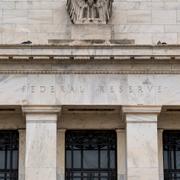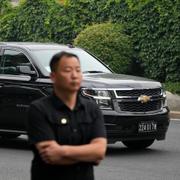
Agenten: ”Vi ville att de skulle jaga spöken”
De agenter som deltog i den hemliga CIA-operationen som Donald Trump lanserade under sin tid som president ska bland annat ha spridit anklagelser om att medlemmar i det kinesiska kommunistpartiet gömmer pengar utomlands. Det uppger källor för Reuters.
Målet med kampanjen var att framkalla paranoia bland Kinas toppskikt och på så sätt tvinga regeringen att lägga resurser på att jaga intrång på det i Kina så hårt kontrollerade internet.
– Vi ville att de skulle jaga spöken, säger en av källorna till nyhetsbyrån.
En talesperson för Kinas utrikesministerium säger att uppgifterna om den hemliga CIA-kampanjen visar att USA:s regering använder sig av ”mediaplattformar som vapen för att sprida falsk information”.
bakgrund
Relationen USA-Kina
Wikipedia (en)
The relationship between the People's Republic of China (PRC) and the United States of America (US) has been mostly complex, and at times, downright strenuous since the establishment of the PRC and the retreat of the government of the Republic of China to Taiwan in 1949. Since the normalization of relations in the 1970s, the US–China relationship has been marked by numerous perennial disputes, including: the political status of Taiwan, territorial disputes in the South China Sea, and more recently the treatment of Uyghurs in Xinjiang. They have significant economic ties and are significantly intertwined, yet they also have a global hegemonic great power rivalry. As of 2023, China and the United States are the world's second-largest and largest economies by nominal GDP, as well as the largest and second-largest economies by GDP (PPP) respectively. Collectively, they account for 44.2% of the global nominal GDP, and 34.7% of global PPP-adjusted GDP.
One of the first major events between the United States and Chinese governments was the 1845 Treaty of Wangxia. Trade grew slowly, with talk of a giant buyers' market in China always making the rounds among American capitalists. In 1900, Washington joined the imperial powers of Europe and the Empire of Japan in sending troops to crush the anti-imperialist Boxer Rebellion. The Open Door Policy ostensibly opposed the subsequent carving up of China into spheres of influence among the victorious powers. Hopes that American financial power would be ascendant failed to materialize, as efforts during the Taft presidency to aid American banks invest in Chinese railways failed. President Franklin D. Roosevelt made support of China during the Second Sino-Japanese War. The US allied itself with the Republic of China (ROC), under which the Chinese Civil War had paused, with the ROC and Chinese Communist Party (CCP) forming a unified front to fight the Japanese—after the Americans joined the war against Japan in 1941. After the end of World War II and the resumption of the civil war, the US tried and failed to negotiate a settlement between the Nationalists and Communists, with the latter eventually achieving victory, driving the Nationalist government into exile on Taiwan, and proclaiming the establishment of the People's Republic of China (PRC) in 1949. Relations between the US and the new Chinese government quickly soured. An early setpiece of the emerging global Cold War was the American-led United Nations intervention in the Korean War: China reacted by joining the war against the UN, sending millions of Chinese fighters to prevent a US presence on the Chinese border. For decades, the US refused to recognize the PRC as China's legitimate government, in favor of the ROC based in Taiwan, and as such blocked the PRC's membership in the United Nations. After the Sino-Soviet split, the winding down of America's war in Vietnam, as well as of the Cultural Revolution, US President Nixon's 1972 visit to China came as a shock to many observers, ultimately marking a sea change in US–China relations. On 1 January 1979, the US formally established diplomatic relations with the PRC, and recognized it as the sole legitimate government of China. However, it did not cease its military support for the ROC on Taiwan, working within the framework of the Taiwan Relations Act, with this issue continuing as a major point of contention between the two countries to the present day.
Every US president since Nixon has toured China, with the exception of Jimmy Carter. The Obama administration signed a record number of bilateral agreements with China, particularly regarding climate change, even as its East Asian pivot strategy strained relations. The advent of the Xi administration would prefigure a sharp downturn in these relations, which was then further entrenched upon the election of President Donald Trump, who had promised a combative stance towards China as a part of his campaign, which began to be implemented upon his taking office. Issues included China's militarization of the South China Sea, alleged manipulation of the Chinese currency, and Chinese espionage in the United States. The Trump administration would label China a "strategic competitor" in 2017. In January 2018, Trump launched a trade war with China, which the Chinese characterized as part of the unjustified containment strategy begun by the American pivot towards East Asia and the Asia-Pacific. The United States government banned American companies from selling equipment to various Chinese companies linked to human rights abuses in Xinjiang, among them which included Chinese technology conglomerates Huawei and ZTE. The US revoked preferential treatment towards Hong Kong after the passage of a broad-reaching security law in the city, increased visa restrictions on students from China, and strengthened relations with Taiwan. In response, China adopted a so-called 'wolf warrior diplomacy', countering American accusations of human rights abuses. By early 2018, various geopolitical observers had begun to speak of a new Cold War between the two powers. On the last day of the Trump administration in January 2021, the US officially recognized the Chinese government's treatment of the Uyghurs in Xinjiang as a genocide.Following the election of Joe Biden in the 2020 United States presidential election, tensions between the two countries have continued to be strained. Biden prioritized competing with China as a priority in his foreign policy. His administration imposed large-scale restrictions on the sale of semiconductor technology to China, boosted regional alliances against China, and expanded support for Taiwan. However, the Biden administration has also stated that the US seeks "competition, not conflict", with Biden saying in late 2022 that "there need not be a new Cold War."
Omni är politiskt obundna och oberoende. Vi strävar efter att ge fler perspektiv på nyheterna. Har du frågor eller synpunkter kring vår rapportering? Kontakta redaktionen



